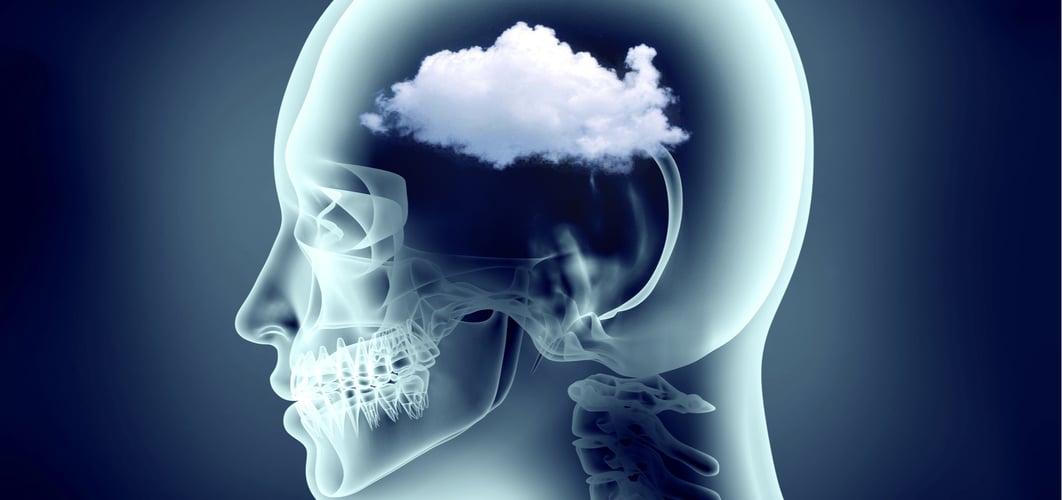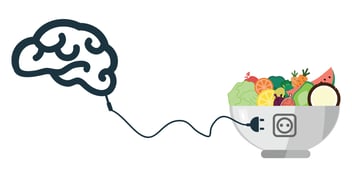What is the Relationship Between Cellular Health and Brain Fog?
- Home
- Blog

What You Will Learn in this Blog:
- How brain fog can detract from living your fullest life—and how changing your diet can help
- Why keeping your cells healthy keeps your brain happy
- The importance of specific minerals, vitamins, and other nutrients in cellular health and cognitive functioning
- How genetic testing can help you pinpoint what nutrients your cells are lacking
Have you or your loved ones ever experienced a period of time where you felt like you just couldn’t focus? Perhaps, in telling a story at dinner, you forgot mid-sentence what you meant to say. Or perhaps as you drove to work, you suddenly could not recall the route you’ve taken every day for the last several years. There are numerous other examples of the sensation I’m talking about, from forgetting seemingly simple details to finding it impossible to concentrate on whatever task is at hand—but one thing these examples all have in common is that they can lead to a real sense of helplessness and loss of control. If any of this sounds familiar, you may be experiencing brain fog. And if you’re like many of our patients at Potomac Psychiatry, you may be getting more and more worried with each passing day of symptoms.
Are You Experiencing Brain Fog?
For many individuals, loss of cognitive ability is the single most pressing health concern they face as they approach mid-life. People are twice as likely to be concerned about losing their mental health as they are about declines in their physical health. Not being able to think clearly impacts all aspects of life—and these impacts are uniformly negative.
Brain fog is a non-medical term that describes a host of symptoms including short-term memory loss, difficulty managing schedules and multiple tasks, word loss, and attention deficit. These are all signs that the cells of the brain—the neurons and microglia—are not functioning optimally. There are several reasons that brain cells do not function well including low nutrient status at the cellular level; poor gut health; toxicity; lack of hormonal signaling; traumatic events; chronic inflammation at the cellular and systemic levels; and much more.
It would take an entire book series to give each of these areas complete investigation, so in this post I will focus on the first and most likely of these possible causes of brain fog: lack of nutrients at the cellular level. Not surprisingly, the nutrient status of our brain cells often determines whether the other potential causes of brain fog manifest, supporting our assertion that nutrition is the foundation of health and well-being.
Cellular Health, Nutrient Intake, and Brain Fog
When considering the root cause of brain fog, the first place that we need to look is at our nutrient intake to ensure that our brain cells are getting enough of the right kinds of fuel. At its most basic level, food provides the vitamins, minerals, fatty acids, and energy that our cells require to carry out their specific jobs in the body. The biochemistry of the role that nutrition plays in our cells is well documented and well understood. Whether we are talking about a muscle cell, a kidney cell, or a brain cell, if we are not providing the nutrients needed for the cell to operate as designed, then the cell will experience dysfunction.
Just like expecting your car to run properly without gas, your brain cells cannot function properly without the type of fuel they require. When the level of dysfunction in the cell passes a certain threshold, the tissue that is made up of those cells, will not be able to function optimally. When the dysfunction at the tissue level reaches a certain threshold, the organ systems that it comprises will begin to show dysfunction. And thus, when the organ-level systems begin to function below optimal levels, we find ourselves in the doctor's office, looking for help to address a health concern.
Beat Brain Fog with Nutritional Psychiatry
In the practice of nutritional psychiatry, we are looking for the root causes of disease and dysfunction so that we can address them and allow the body to regain balance. Thus, starting by looking at the very basic function of nutrition—providing nutrients to the cell—allows us to correct imbalances and deficiencies at the foundation which can stimulate healing from the bottom up.
Here are some of the top nutrients and functional foods that our brain cells need to function optimally:
- The suite of B vitamins works synergistically to support energy production within our cells and is closely tied to brain health. Adequate amounts of B vitamins (Thiamin, Riboflavin, Niacin, Folate, Pantothenic acid, Pyrodoxine, B-12) are required for the functioning of our nervous system. B vitamins are found in a wide range of whole foods including beef liver, eggs, fish, nuts and seeds, leafy greens, berries, and most fruits and vegetables.
- Specialized Omega 3 fatty acids, EPA and DHA, are found in large amounts in the brain and throughout the nervous system. They play a key role in promoting anti-inflammatory messengers and are a part of the structure of the cell membranes. Increased intake of EPA and DHA improved short-term memory, attention, and processing speed in patients with cognitive impairment. High levels of EPA and DHA are found in fatty fish such as salmon, sardines, anchovies, mackerel, and herring.
- Minerals act as helper molecules throughout the body. My favorite mineral, Magnesium, is the star of your biochemical show due to its involvement in over 300 reactions throughout the body. Sub-optimal levels of serum magnesium are directly associated with worse outcomes on cognitive testing. This can be troubling when we consider that the majority of Americans do not meet the recommended daily intake through their diet. High levels of magnesium are found in nuts and seeds, spinach, beans, and dark chocolate.
- Vitamin D is a fat-soluble vitamin that affects immune, skeletal, and cognitive health which comes from endogenous production in our skin with exposure to sunlight, a few foods, and supplements. Research shows that low levels of vitamin D are associated with lower cognitive performance. Unfortunately, almost everyone (97%) is not getting enough vitamin D through diet! Further, other factors such as lack of time spent outside, use of sunscreen, and protective clothing make vitamin D deficiency extremely common. When we consider the role that vitamin D plays in cognition, it’s important to ensure you are getting enough of this important vitamin.
- Diets that are high in fiber such as the Mediterranean Diet, are associated with a decreased risk of cognitive decline. Researchers think the link between fiber and cognition is related to the production of Short Chain Fatty Acids (SCFA) by the fermentation of dietary fiber by beneficial bacteria. SCFAs can directly increase serotonin production and also travel through the vagus nerve to the brain where they exert anti-inflammatory effects on neurons. Foods that are high in the specific type of fermentable fiber called resistant starch include cooked and cooled legumes, grains, potatoes, as well as plantains, artichokes, and bananas.
- Blue-Purple foods have been associated with cognitive health in multiple studies. The plant compounds that create the blue-purple color are collectively called polyphenols. Research suggests that foods like cherries and blueberries improve cognition by increasing the production of brain-derived neurotrophic factor (BDNF) within the neurons. Increases in BDNF are associated with improved cognition. Blue-purple foods include red onion, blueberry, plum, grape, cherry, purple potato, carrot, kale, and cabbage.
Personalized Medicine, Diagnostic Testing, and your Cellular Health
The era of personalized medicine is upon us, and it’s no longer adequate to look at RDAs in order to determine if your diet is meeting your cellular health needs. Further, the nutrient density of foods varies depending on the health of the soil, the ripeness at harvest, and the time between harvest and consumption. We can now use several tests to help you understand the nutrient status of your cells.
My favorite test to assess cellular health is the Genova Diagnostics NutrEval or Metabolomix+ which assesses the functional need for antioxidants, B-vitamins, minerals, digestive support, fatty acids, and amino acids using organic and amino acid levels. This is the best way to understand your actual nutrient status because there are many reasons why all the nutrients that we eat are not digested and assimilated into your body. Further, we are all unique in our genetic efficiency and you may need more of a certain nutrient than your neighbor based on how your biochemistry works.
A second diagnostic test that can be helpful in assessing the cause of brain fog is Genova Diagnostics GI Effects Comprehensive Stool Test which assesses microbiome health, inflammation, and digestion/absorption. The stool offers an ‘insider's view’ of the state of your digestion and shows us your ability to absorb nutrients from your diet. Disruption in our ability to break down the food we eat into the nutrients that we can absorb is a key cause of cellular nutrient depletion. The stool test allows us to see how the very foundation of our health, the gut, is functioning and what we may need to do to improve it.
Beating Brain Fog Once and for All
Reader, by paying attention to your cellular health, you can beat brain fog for good—and we can help. Potomac Psychiatry specializes in using personalized precision psychiatry, which can help you determine which nutrients you need more of and how to incorporate them into your diet. If you or a loved one are suffering from forgetfulness, confusion, or other symptoms of cognitive impairment, give nutritional psychiatry a try. You won’t regret it.
.png?width=144&height=144&name=Untitled%20design%20(34).png)



